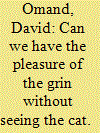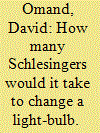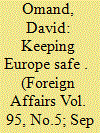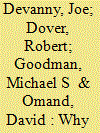| Srl | Item |
| 1 |
ID:
084060


|
|
|
| 2 |
ID:
066563


|
|
|
| 3 |
ID:
143199


|
|
|
|
|
| Summary/Abstract |
LONDON—In 1910, one of the last remaining bands of outlaws of America’s Wild West emerged from their hideout in the Sierra Ladrones Mountains in New Mexico and heisted a Wells Fargo shipment. The Sierra Ladrones (literally, in Spanish, Robbers’ Mountains) are only 45 miles as the crow flies from Albuquerque, but in 1910 there were an un-policed wilderness. The gang retreated with their booty and hid in the canyons. It took two years for the bounty hunters employed by Wells Fargo to track them down, ending inevitably in a final fatal shootout.
|
|
|
|
|
|
|
|
|
|
|
|
|
|
|
|
| 4 |
ID:
075682


|
|
|
| 5 |
ID:
178916


|
|
|
|
|
| Summary/Abstract |
This chapter first describes the importance of secret intelligence in protecting the public from terrorist attacks. The use of intelligence in deriving the strategic aim of the integrated U.K. counter-terrorism strategy, CONTEST, and supporting its delivery is examined. The ethical issues associated with the general practice of secret intelligence are identified by referencing the Just War tradition establishing ethical restraints on armed conflict. Parallels are drawn to derive jus ad intelligentiam and jus in intelligentio ethical concepts to govern the acquisition and use of secret intelligence. The chapter concludes by applying these ideas to the techniques currently in use for counter-terrorism, especially the role of digital intelligence gathering today in helping uncover terrorist networks and frustrate attacks. Specific areas of counterterrorism work that nevertheless continue to raise significant ethical issues are identified.
|
|
|
|
|
|
|
|
|
|
|
|
|
|
|
|
| 6 |
ID:
119419


|
|
|
|
|
| Publication |
2013.
|
| Summary/Abstract |
A decade ago, the literature on the relationship between ethics and intelligence was very limited. However, the post-9/11 (11 September 2011) intelligence and security environment, in which national intelligence agencies have been required to play front line "war on terror" roles, has heightened the importance of debate about, and an informed understanding of, the ethics-intelligence relationship. But any such debate requires a framework. Consequently, over recent years, a literature on ethics and intelligence has begun to develop. Our aim is to contribute to this movement, add further flesh to the framework, and encourage others to participate in the debate.
|
|
|
|
|
|
|
|
|
|
|
|
|
|
|
|
| 7 |
ID:
089629


|
|
|
|
|
| Publication |
2009.
|
| Summary/Abstract |
We must be grateful to Michael warner for drawing attention to the declassification of the full report by Dr James Shlesinger, arguing in 1971 the case for reform of the governance and structure of the US intelligence community.
|
|
|
|
|
|
|
|
|
|
|
|
|
|
|
|
| 8 |
ID:
111187


|
|
|
| 9 |
ID:
147108


|
|
|
|
|
| Summary/Abstract |
Just before 11 PM on Thursday, July 14, a 19-ton truck turned onto a seaside promenade in Nice, France, where crowds had gathered to watch Bastille Day fireworks. The truck sped up, plowing into the people on the promenade. By the time French police shot the driver, the truck had traveled 1.1 miles, killing 84 people [1] and injuring hundreds more. That attack came less than four months after three terrorists killed 32 people in explosions in the departure hall of Brussels Airport [2] and a metro car near Brussels’ Maelbeek subway station. And it came eight months [3] after a group of young men killed 130 people in Paris, in the deadliest attack on France since World War II. The self-proclaimed Islamic State, or ISIS, claimed responsibility for all three attacks.
|
|
|
|
|
|
|
|
|
|
|
|
|
|
|
|
| 10 |
ID:
173644


|
|
|
| 11 |
ID:
163355


|
|
|
|
|
| Summary/Abstract |
In this article, Joe Devanny, Robert Dover, Michael S Goodman and David Omand explore the current problems facing intelligence analysis and analysts in the UK and consider what might be done to tackle them. They argue that nothing less than a revolution in the British government’s approach to intelligence assessment is required and that this ought to take the form of a School of Intelligence Assessment within a properly financed and structured National Security Academy.
|
|
|
|
|
|
|
|
|
|
|
|
|
|
|
|